Hemp and Cannabis Pioneer, Scott Sparks, Navigates Legalization in Vermont
April 10, 2023
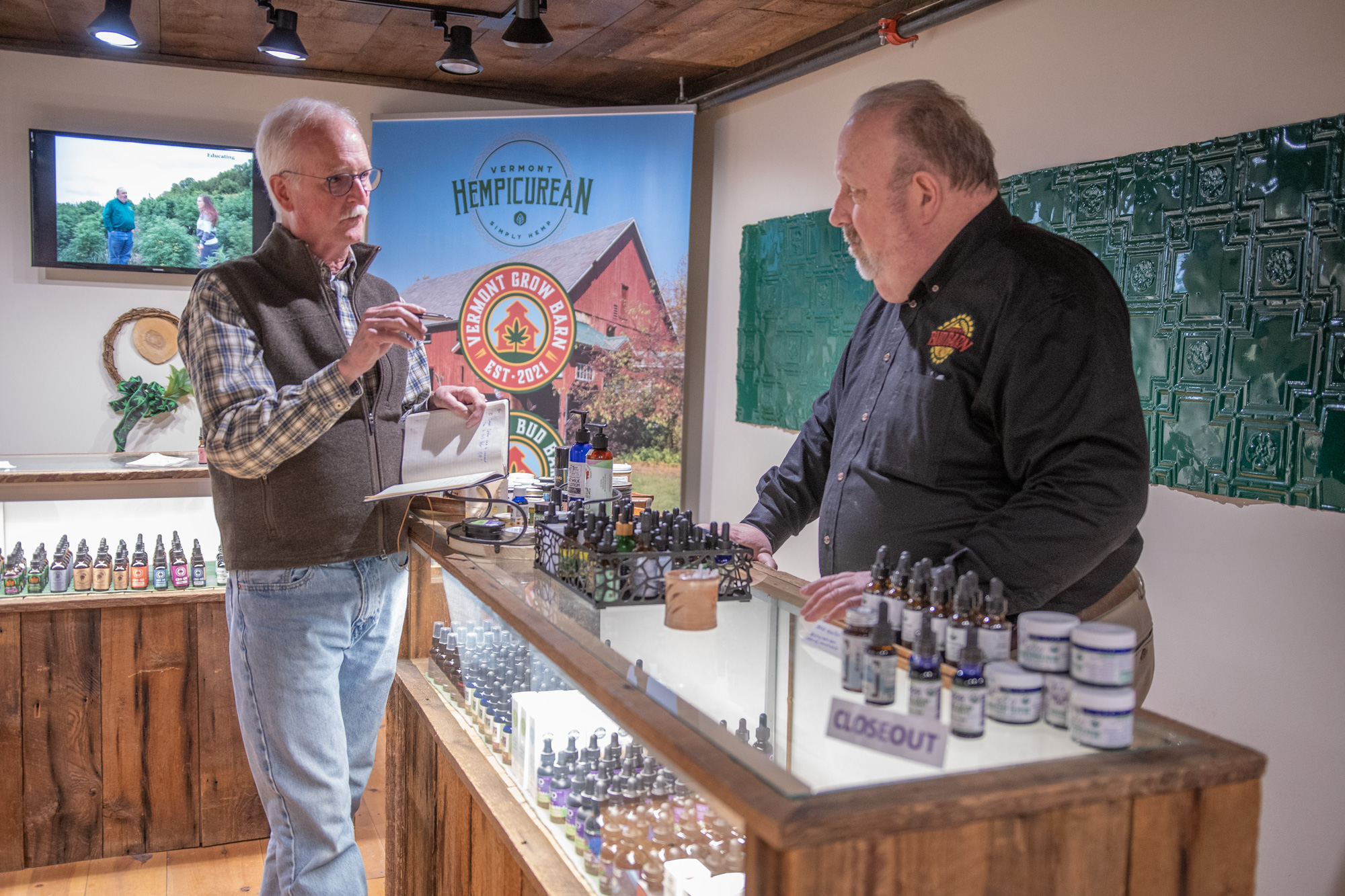
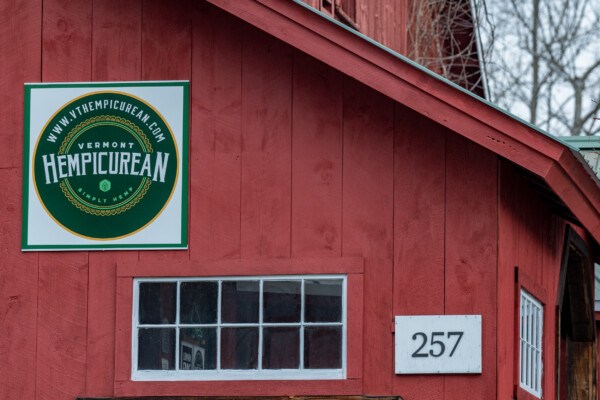
Signage at Vermont Hempicurean located on Route 9 in West Brattleboro. Photo by Erica Houskeeper.
Scott Sparks always knew he wanted to open a cannabis business, but it was not until he was in his 60s, ready to retire from his decades long career in food service, that his dream began to take shape.
A few days after deciding to leave his position as VP of Sales at Black River Produce, he received a spam email promoting the Northern Colorado Hemp Expo. “I took it as a sign,” he said, “and booked two VIP tickets.” Sparks had heard a little about CBD, but was not prepared for what he saw at the expo. “I was blown away,” he said. “It was all serious, professional business people.”
That was 2017, the early days of CBD’s popularity. CBD, is derived from the Cannabis sativa plant and contains only small amounts of Tetrahydrocannabinol (THC), the psychoactive component of cannabis that produces a “high.” At the time, CBD products were required to be lab tested and confirmed to contain 0.3% THC or less. Consumers of CBD use it to treat chronic pain, inflammation, migraines, and anxiety, among other conditions.

CBD Gummies line the shelves at Vermont Hempicurean in West Brattleboro. Photo by Erica Houskeeper.
Recognizing an opportunity to be at the forefront of CBD retail, Sparks opened Vermont Hempicurean in downtown Brattleboro in April 2018. His initial offerings included hemp products such as rope, paper, seeds, and oil, but realized that his customers were more interested in locally-produced CBD and growing supplies such as soil, nutrients, and lights.
Thus began a years-long effort to navigate consumer demand as well as new, and sometimes changing, local, state, and federal rules and regulations. For the next few years, he operated Vermont Hempicurean, always with one eye on legalization, establishing himself as a successful, respected business owner and a welcome addition to downtown Brattleboro. So, when the state of Vermont legalized cannabis sales in October 2020, Sparks was well-positioned to be among the first to open a recreational dispensary.
He began conversations with the Brattleboro Selectboard about putting retail cannabis sales on the Town Meeting Day ballot. It was not without controversy but, with support from town officials, Sparks doubled down to make his case and ultimately the ballot measure was passed 1,397- 425 in March 2021. From banking to advertising, however, Sparks says almost everything he tried to do was met with “no.”
“You have to find your way around ‘no’ in this business,” he said. “I had to overcome so many odds, but overcoming the stigma and being able to sell cannabis is one of the most rewarding things I’ve ever done.”
Finding support Through Coaching
Realizing that he was navigating uncharted waters, Sparks reached out to Ellen Kahler, who he knew from his years in the food industry, at the Vermont Sustainable Jobs Fund (VSJF) about business coaching. Kahler connected him with Victor Morrison, a VSJF business coach also based in Brattleboro in December 2021. “Just having a sounding board, someone to talk to was the biggest benefit,” said Sparks.
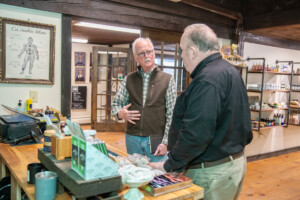
VSJF business coach Victor Morrison, left, consults Scott Sparks on a recent visit to Vermont Hempicurean in West Brattleboro. Photo by Erica Houskeeper.
“CBD and cannabis are multidimensional and new,” said Morrison. “Scott has been confronted with regulations that are changing all the time. It’s hard to get traction. You can’t do business the normal way.”
Coaching Sparks was unique, according to Morrison, in that he was already an experienced business person, confident and realistic in his vision. “I’m not trying to talk him down from an unrealistic dream; I’m helping him figure out how to realize his dream,” he said.
“Scott is a professional,” he continued, “but no one had experience in this brand new market with unclear laws that conflict at the state and federal level, few if any standards of quality, and a gold rush mentality among many. His years of experience with CBD prepared him–as best one can be–for the cannabis roll out statewide, but it was still a challenge.”
Morrison made important introductions, helped Sparks think through an employee handbook, and worked alongside him to sort through a myriad of regulations around cannabis. Most importantly, he was available to help Sparks work through challenges as they arose, acting as a sounding board to bounce ideas around or simply vent frustrations.
Realizing a Lifelong Dream
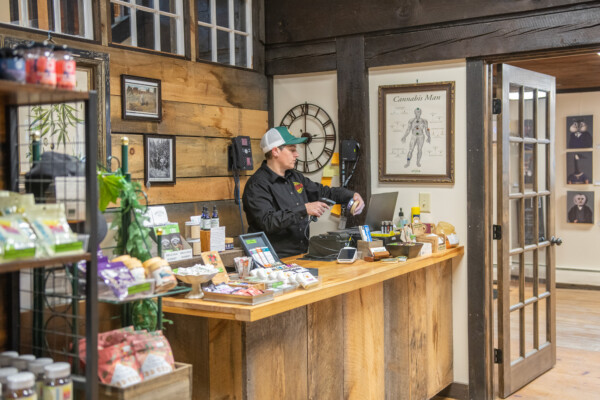
Leslie Garziano scans products at Vermont Hempicurean in West Brattleboro. Photo by Erica Houskeeper.
Sparks began looking to expand from the downtown location of Vermont Hempicurean. He found a big, old, barn on Route 9 in West Brattleboro that was perfect for his vision. “The barn was just the vibe I had in mind,” he said.
But, it turns out, buying the building would be far from straightforward. “You can’t have a cannabis business in a building with a mortgage,” explained Sparks, “and I didn’t have the money to purchase and renovate the barn outright.”
He began talks with potential investors, eventually finding one who was willing to purchase the building. The next day, however, he found out the barn had been sold to someone else. “I scrambled to find out who had bought it,” said Sparks, who discovered the new owner was the father of a fellow Brattleboro business-owner he knew. “After multiple meetings, we came to an agreement and started making build out plans,” he said. “I had to jump through lots of hoops to make it happen and the bills kept going up but I realized that I did not want an investor; I had to make this happen on my own.”
He moved Vermont Hempicurean to the new location in February 2022 and established a separate LLC for growing supplies, called Vermont Grow Barn. On October 24, 2022, once cannabis sales were legalized, he opened the Vermont Bud Barn.
It was a dream come true. For Sparks, opening a cannabis business is about much more than selling products. It’s about dispelling myths about cannabis consumption, supporting local growers and producers, and moving beyond the stereotypes and stigma associated with its consumption.
“CBD and cannabis consumers are not who you think they are,” he said. “We have ladies from the church, older folks and successful business owners, as well as young people. People can finally come out of the shadows and talk openly about cannabis without fear.”
Navigating the New Rules of Cannabis
His challenges, however, were far from over. Among the most significant was banking. Because cannabis is still illegal on a federal level, most FDIC insured banks will not work with cannabis businesses. The only bank that was willing to do business with Vermont Hempicurean was the Vermont State Employees Credit Union, but they declined to continue working with Sparks when he opened Vermont Bud Barn.
His only choice at that point was an online bank called Dama Financial. They promised an on-site safe where he could make cash deposits that would be credited to his online account the next day. Once a week, an armored vehicle would pick up the cash. As soon as Sparks paid the fees, however, he learned they would do neither–no safe and no armored pick up. “They sold me a bill of goods that cost me thousands of dollars,” he said.
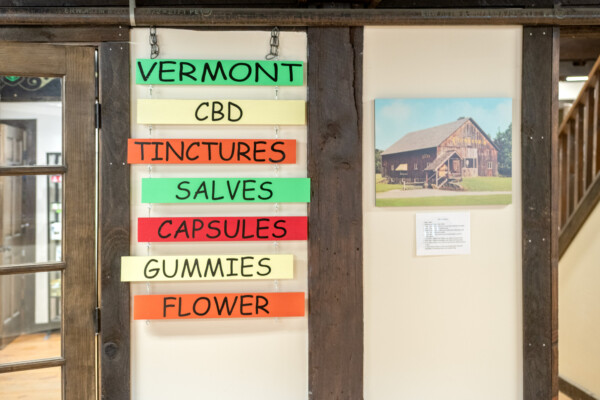
Signage at Vermont Hempicurean located on Route 9 in West Brattleboro. Photo by Erica Houskeeper.
Although Brattleboro Savings & Loan was initially willing to work with Sparks, they have since closed down all cannabis business, sending Sparks back to square one. “Here I have a legal business and no way to do banking.”
Advertising and licensing have also been points of frustration for Sparks. State law requires all employees who sell accessories, like rolling papers and pipes, to go through tobacco training at the Bureau of Alcohol, Tobacco, and Firearms. “What does tobacco have to do with this business?” asks Sparks. “Nothing.”
State law requires cannabis businesses to “age-gate” their websites, asking visitors to confirm they are over the age of 21, and to prove that no more than 15 percent of people who view their ads are underage. “It effectively means I can’t advertise,” said Sparks, who notes that recipes for craft cocktails and events sponsored by beer companies are promoted freely. “Why is one controlled substance treated so differently from another?” asked Sparks. “I just want to be treated like a normal business,” he said.
“It hasn’t been that long since he opened his doors and he’s done well,” said Morrison. “I can only imagine how successful he’d be if banks, insurance companies, payroll services, and accounting software had provided services to cannabis companies without reservation from the outset.”
Undeterred, Sparks Plans for the Future
Sparks now operates four businesses: Vermont Hempicurean, Vermont Bud Barn, Vermont Grow Barn, which sells growing supplies, and his newest endeavor, In the Weeds, where he plans to grow cannabis. Despite a challenging road to this point, Spark’s has big goals for the future.
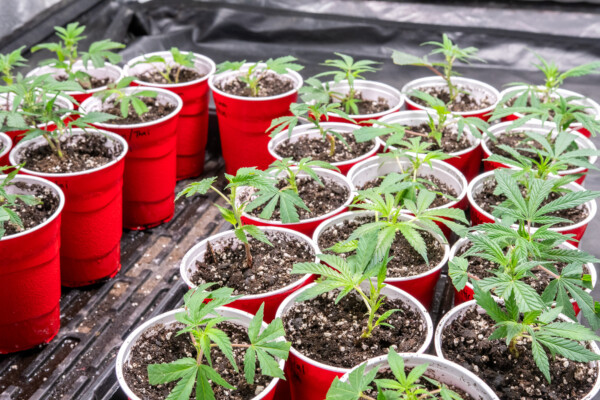
Cannabis plants at the Vermont Grow Barn in Brattleboro. Vermont Grow Barn, a grow supply store, was established in 2021 by Scott Sparks as a sister store to his CBD shop Vermont Hempicurean. Photo by Erica Houskeeper.
Dedicated to selling locally-made and locally-grown hemp and cannabis products, Sparks sees an opportunity for Vermont to tap into the same branding that has put the state on the map for craft beer and cheese. “It’s about terroir and small producers who care deeply about the quality of their product,” he said. His businesses sell exclusively Vermont-made CBD, hemp and cannabis.
He also hopes someday to open a cannabis cafe, where people can gather to see live music and socialize, and is considering a viewing window at In the Weeds, where customers can learn about the growing process.
Mostly though, he looks forward to a day when cannabis businesses in Vermont can operate without the stigma, extra steps, and added fees that currently add complexity and cost. “I run a legal business,” said Sparks. “Why should I be treated differently?”
About VSJF’s Business Management Coaching Program
The Vermont Sustainable Jobs Fund provides tailored, high-touch planning, coaching, and advising for business owners and their management teams to advance profitability, job creation, and sustainable job development. Click for more information about business management coaching.
Read More Stories Like This:
- Business Sense Training Series for Entrepreneurs and Small Business Owners
- Pioneers of African Cuisine, Global Village Foods Finds Community in Vermont
- For Olivia’s Croutons Founder, Coaching is the Best Thing Since Sliced Bread
- Slowing Down to Go Fast: Luce Farm Wellness Rides the CBD Wave
- The Optimistic Caterer: Sugarsnap Keeps On Cooking




